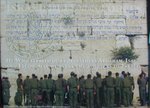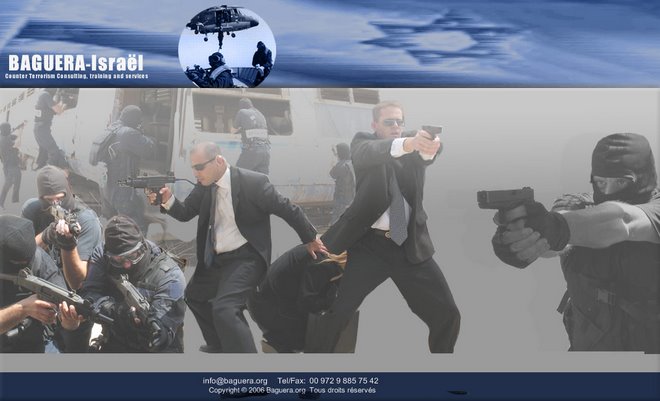Al Qaeda has recently declared "Cyber Jihad" on the West. The terror group's electronic experts will now apparently be attacking certain anti-Islamist websites.
What exactly is Cyber Jihad? What exactly will wanna-be jihadists who cannot be martyrs on the battlefield be doing on the net to fulfill their jihadi obligations?
What dangers does the electronic war pose to the internet and to the West in general?
To discuss these issues with us today, Frontpage Symposium has assembled a distinguished panel. Our guests today are:
Neil Doyle, one of the world's top investigative journalists, a pioneering author, and a leading expert on international terrorism. He is the author of Terror Base UK: Inside a Secret War.
Lawrence Prabhakar, an Associate Professor of Political Science at Madras Christian College, Chennai, India and a Visiting Fellow at the S. Rajaratnam School of International Studies at Nanyang Technological University in Singapore. Dr. Prabhakar specializes in academic and policy research in issues of nuclear weapons and Asian Security, Asymmetric Conflict, Maritime Security and grand strategy of India, China and United States.
and
Arie Kruglanski, a Distinguished University Professor at the University of Maryland, College Park. He has recently served as member of the National Academy of Science panels on counterterrorism, and educational paradigms in homeland security, and is serving on the NAS Board for Cognitive, Social and Sensory Processes. Kruglanski also serves as a co- PI at START (National Center for the Study of Terrorism and the Response to Terrorism), at the University of Maryland.
FP: Neil Doyle, Lawrence Prabhakar and Arie Kruglanski, welcome to Frontpage Symposium.
Lawrence Prabhakar, let us begin with you.
What does cyber jihad entail in general and what threat does it pose?
Prabhakar: Cyber Jihad represents the new defining paradigm of asymmetric conflict that is being launched by the wannabe jihadists in attacking a superior adversary with enduring tactics and weapons of the electronic cyberspace.
The contest pits the defending West against the host of coordinated attacks by a radical ideology that is determined of its objectives in terms of inflicting predatory physical violence; massive economic destruction and triggering a social and civic collapse that would destroy the very fabric of the liberal-democratic edifice.
The war in cyberspace is a virulent attempt to:
i) intimidate the public;
ii) impose the pervasive influence of a dogma that seeks radical transformation of the rest of the world to its whims or face the impunity of being destroyed;
iii) win the contest of the public space that delegitimizes all governments, civic institutions, democratic values;
iv) glorify violence and denigrate all pacific initiatives to development and growth;
v) promote religious obscurantism as the means of an emergent order.
Cyber jihad enjoys all the technological advantages of its adversary--the West, though it is asymmetrically weak in resources, yet its high human motivational force provides it the prospect to overwhelm the West that is now being surmounted not only by the predatory, asymmetric and attritional power of the cyber jihadis, but it also confronts the assertive and revisionist challenges of Russia, China Iran and North Korea who are evermore determined to attrite and assail the power of the West, the values of liberal-democracy and impose an authoritarian world order.
Kruglanski: Concern about cyberterrorism dates back to the early 1990s time at which the increased use of the internet aroused concerns about vulnerability of critical infrastructures in the realms of economy, energy, security, and aviation to interference by computer savvy terrorists.
There has been a bit of confusion as to exactly what qualifies as cyberterrorism. Experts have distinguished between the use of the syberspace for criminal purposes, for purposes of protest and political activism, the so called "hactivism", and bona fide cyberterrorism. Dorothy Dunning, a professor of computer science and an expert on cyberterrorism offered the following definition of the problem:
Cyberterrorism is the convergence of cyberspace and terrorism. It refers to unlawful attacks and threats of attacks against computers, networks and the information stored therein when done to intimidate or coerce a government or its people in furtherance of political or social objectives. Further, to qualify as cyberterrorism, an attack should result in violence against persons or property, or at least cause enough harm to generate fear. Attacks that lead to death or bodily injury, explosions, or severe economic loss would be examples. Serious attacks against critical infrastructures could be acts of cyberterrorism, depending on their impact. Attacks that disrupt nonessential services or that are mainly a costly nuisance would not.
In terms of this definition, no single instance of counterterrorism has occurred as yet. Nonetheless, the concern about the problem has been considerable and it gave rise to multiple research reports, simulation exercises as well as work of fiction exploring the potential devastation that cyberterrorism could produce. Such potential is considerable indeed. Most critical infrastructures in modern societies are largely functioning through computer networks. In this sense, terrorists could (theoretically) break into and disable major sectors of advanced economies.
There are several issues here:
(1) how protectable are modern infrastructures?
(2) whether terrorists have the ability, and
(3) the motivation to do what it takes to create major havoc.
Briefly, major governmental infrastructure are protectable through air gapping that separates their networks from the internet. This applies less to infrastructures in the private sector, though attempts are under way to protect those as well. With respect to the second question, most reports conclude that at least thus far terrorist organizations haven't had the technical know how and the wherewithal to produce a major cyberattack. However, capabilities can be developed and what may have been true thus far may not be true with further technological developments and with new generations of possible jihadists who grow up in computerized environments and may have considerable skills at their commands unavailable to their predecessors. The real critical question then is one of motivation. Under what conditions, may the motivation be reduced to use cyberterrorism or in fact any kind of terrorism. This framing of the issue transforms the problem from the real of technology to that of psychology, and the battle for the souls and minds of would be cyberterrorists.
Doyle: To me, the term "cyber jihad" simply means any form jihadist activity that occurs online. It can also involve cyber-terrorism and that usually takes the form of "denial of service" attacks against websites that are perceived to be anti-jihadist or un-Islamic. There are a few groups that claim to undertake hacking activities in the name of al-Qaeda, though the known number of serious incidents is small. The most common incidents are website defacements, where the attackers take advantage of poor security and basically commit petty vandalism. That normally involves replacing a website's usual homepage with one containing anti-Western messages. The capabilities of the jihadists - at the moment - pales into insignificance when compared to state-sponsored hackers operating out of China and North Korea, who target government systems and databases maintained by defence and intelligence agencies.
Cyber-jihadists can be involved in recruiting, fundraising, training, and the dissemination of propaganda and military information. Some prominent members of al-Qaeda-supporting Web discussion forums are reported to have been killed on the battlefield, though the number would appear to be small. One significant use of these kinds of sites is for group working, where people who might be widely dispersed geographically come together to exchange intelligence, tips on bomb-making and even plan attacks.
Electronic warfare does pose dangers, in terms of disrupting Internet traffic and Net-connected systems, such as power grids and other utilities. We've yet to see the long-predicted "electronic Pearl Harbour", but I think in the years to come we may well see an attempt at least to, say, knock-out a road traffic control system as part of a major al-Qaeda attack.
Prabhakar: The challenge of cyber-terrorism demands a long-term strategy of its containment and management. The increasing radicalization of the cyberspace with militancy and self-help and self-sensitizing portals is probably the greatest threat that is evident. While fire controls, barriers and countermeasures are all the "hardware" defenses, the imperative is to reinforce appropriate counter-propaganda measures to the self-help; self-sensitizing portals. They are indeed hate portals that are catalytic to the committing of actual criminal operations. The need is to instill and create appropriate countermeasures that would counter this hate process.
Secondly, the threat also comes from symmetric actors even as the asymmetric violent actors dominate the threats to the liberal-democratic systems. How would the liberal-democratic world secure itself from the symmetric actors needs to be seen; there is an active linkage between state-sponsors of asymmetric violence whose realm in the cyber space is evident with the non-state actors whose asymmetric activities pose the greatest threat; how would the free world contend it is an important issue;
Thirdly, the scope of economic interdependence and its even spread matters most in regard to how the cyberspace would be used. The techniques and the process of globalization have immensely benefited the violent asymmetric actors than the genuine stakeholders; what measures of efficacy and security would be needed in the coming years is important even as the cycles of technology and research & development progress on.
Kruglanski: I would like to expand somewhat on jihadist recruitment activity via the internet. It contains two aspects:
(1) presentation of compelling jihadist propaganda,
and
(2) acquisition of information about potential candidates for recruitment.
I learned about the efficacy of jihadist propaganda during a recent visit to a South East Asian country and meeting with a Muslim woman, a research worker at a counterterrorism institute. She related to me, quite anxiously I should add, how she felt increasingly convinced by the video, and how this put her in conflict with her job, and general counterterrorist attitude.
If so, there is great need, as Mr. Prabakhar suggested, for massive and systematic de-radicalization effort on the internet by Muslim governments, and community organizations of various stripes. Additionally, jihadist organizations obtain information about visitors to their websites.
Those visitors who seem particularly interested in contents of the website may then be contacted. Occasionally, recruiters also roam online chat rooms, and cybercaffes as well as electronic bulletin boards and user nets, in search of potential recruits. In 2003, for instance, Al Qaeda launched a massive drive to recruit fighters to travel to Iraq and attack U,S, and coalition forces there. In short, it is incumbent to offer counter arguments to the jihadi rhetoric, and immunize potential visitors to jihadist websites to their pernicious messages.
It is also true, however, that the internet can and has been successfully used to mount effective counterterrorism. Counterterrorism argumentation on the internet is exemplified by the Saudi Al-Sakinah ("Tranquility") campaign, an independent initiative for online dialogue with Islamists in order to prevent the spread of extremist views via the internet. In this project some 40 ulema and propagators of Islam who have Internet skills enter extremist websites and forums and converse with the participants in order to bring them to renounce their extremist ideas. This initiative assisted by psychological and sociological experts in addition to Sunni clerics is claimed to have been successful in persuading extremists to renounce their views.
The internet also affords the opportunity to gather information about terrorist activities, including efforts to infiltrate the innermost terrorist websites, and chat rooms in guise of potential recruits for terrorist missions. In some cases, such work can locate links among terrorist entities and their supporters, that was used to prevent terrorist attacks.
Doyle: What has struck me over the years is the lack of effort that that has gone into countering jihadist propaganda. Donald Rumsfeld once called for more to be done by the military in this area to try and close the "digital divide". The next day, I was contacted by a US military press officer who asked me to publish more of their press releases on my website. It was a start, I suppose. There is certainly a lack of imagination on the Western side and there is little evidence that the divide is being closed. The military could, for example, distribute some of its own battle footage to try and counter the impact video presentations of al-Qaeda and other related groups, but there's is little evidence of that happening.
I can understand how the anti-terrorism researcher has been swayed. When you are constantly viewing material that focuses on a narrow slice of reality, the boundaries of objectivity can waver. One might start thinking "well, I have to admit, they do have a point there". A program of de-radicalism has been started in the UK, consisting of a network of local public extremism forums. It is far too early to judge what impact those kinds of "hearts and minds" initiatives might have, not least because the Internet and government work at different speeds.
There are people taking issue with others in discussion forums with suspicious regularity, though they will get short shift on the more hard-line sites. The recent case of the release, by the Court of Appeal, of five students is pertinent. They downloaded propaganda and ideological material from websites but the judges ruled that there was no evidence that they were going to use those in preparing a terrorist act, in essence. Proof of intent is required, and that would be especially so in cases of self-radicalization, perhaps. The government has been talking about getting ISPs to block access to extremist websites and this will be a blow to that idea.
As well as propaganda, planning, and recruitment uses, the internet is crucial for fund-raising. The London-based cyber-jihadist Younis Tsouli, who was known online as Terrorist 007, was also involved in credit card fraud to the tune of $4 million. There are many others like him out there somewhere.
FP: Neil Doyle, Lawrence Prabhakar and Arie Kruglanski, thank you for joining Frontpage Symposium.
Jamie Glazov is Frontpage Magazine's managing editor. He holds a Ph.D. in History with a specialty in U.S. and Canadian foreign policy. He edited and wrote the introduction to David Horowitz’s Left Illusions. He is also the co-editor (with David Horowitz) of The Hate America Left and the author of Canadian Policy Toward Khrushchev’s Soviet Union (McGill-Queens University Press, 2002) and 15 Tips on How to be a Good Leftist. To see his previous symposiums, interviews and articles Click Here. Email him at jglazov@rogers.com.
































 While doing IDF (Israel Defence Forces) reserve duty on a mountain overlooking the
While doing IDF (Israel Defence Forces) reserve duty on a mountain overlooking the 





No comments:
Post a Comment